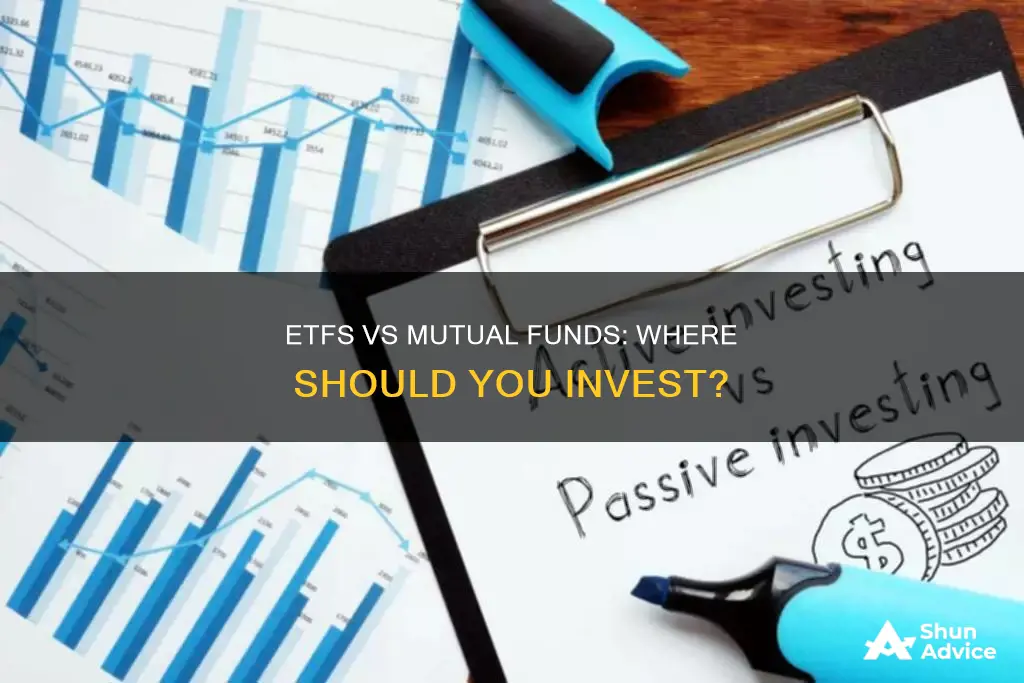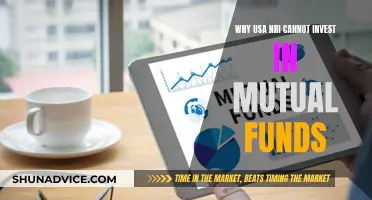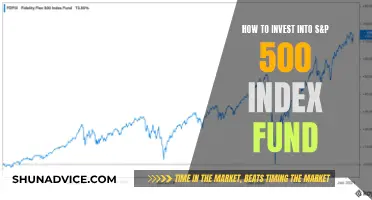
Exchange-traded funds (ETFs) and mutual funds are two popular investment options for those looking to diversify their portfolios. While both are professionally managed and offer access to a wide variety of stocks and bonds, there are some key differences between the two.
ETFs are a newer type of investment vehicle that can be traded throughout the day, like stocks. They tend to be passively managed, meaning they track a preset index of securities. ETFs are often cheaper than mutual funds, with lower fees and no sales commissions, and they usually don't have a minimum initial purchase requirement.
On the other hand, mutual funds are an older type of investment that can only be bought and sold once a day, at the market close. They are typically actively managed, meaning fund managers aim to beat the market by picking winning stocks. Mutual funds often have minimum investment requirements and may charge higher fees, including sales commissions.
Both ETFs and mutual funds have their advantages and can be good choices for investors, depending on their financial goals, risk tolerance, and investment style.
| Characteristics | Values |
|---|---|
| Initial purchase requirements | Mutual funds often have minimum initial purchase requirements, whereas ETFs can be purchased for the cost of a single share |
| Trading | ETFs are traded throughout the day, like stocks, whereas mutual funds can only be traded once a day, at the market close |
| Management | Mutual funds are usually actively managed, whereas ETFs are usually passively managed |
| Fees | Mutual funds tend to have higher fees and expense ratios than ETFs |
| Commissions | Mutual funds often charge sales commissions, whereas ETFs do not |
| Tax efficiency | ETFs are more tax-efficient than mutual funds |
What You'll Learn

ETFs are more tax-efficient than mutual funds
Exchange-traded funds (ETFs) are generally considered more tax-efficient than mutual funds. This is due to their unique structure, which allows them to minimize taxable events and, consequently, reduce tax liabilities for investors. Here are the key reasons why ETFs are more tax-efficient:
Low Portfolio Turnover:
ETFs typically have lower turnover rates compared to mutual funds. This means they buy and sell their underlying securities less frequently, resulting in reduced realized gains that need to be distributed as taxable events.
Long-term Capital Gains:
The low turnover in ETFs often translates to longer holding periods for their underlying investments. This qualifies the gains realized for more favorable long-term capital gains tax rates, which are typically lower than short-term rates.
Secondary Market Transactions:
When ETF investors sell their shares on the stock exchange to other investors, the ETF portfolio manager doesn't need to buy or sell the underlying investments. This means that one investor's decision to sell doesn't impact other investors, helping to keep capital gains distributions low.
In-kind Creation and Redemption:
ETFs have a unique creation and redemption mechanism. When demand increases, authorized participants can create new ETF shares by assembling baskets of underlying securities. Conversely, when demand decreases, they can disassemble the baskets of securities, reducing the number of shares available. These transactions are typically done "in-kind," exchanging securities for ETF shares without triggering taxable events for the fund.
Fewer Capital Gains Distributions:
While both ETFs and mutual funds must distribute capital gains to shareholders annually, ETFs generally distribute fewer capital gains. This is because mutual funds often have to sell securities to meet redemptions, creating taxable events, while ETFs use their in-kind redemption process to minimize capital gains distributions.
Passive Management:
Most ETFs are passively managed, meaning they track a preset index rather than actively picking securities. This passive approach results in fewer transactions and, consequently, lower taxes.
Tax-efficient Structures:
Certain ETF structures can provide additional tax advantages. For example, exchange-traded notes (ETNs) are tax-efficient because they don't hold any securities, so there are no dividend or interest payments taxed at the investor level.
In summary, ETFs are designed to minimize taxes for investors through their unique structure, lower turnover, passive management, and tax-efficient redemption processes. These features make ETFs a popular choice for investors seeking to maximize their after-tax returns.
A Beginner's Guide to Index Funds via Wells Fargo
You may want to see also

Mutual funds offer active management
Actively managed funds tend to have higher fees and higher expense ratios due to their higher operations and trading costs. The emergence of lower-cost ETFs has helped to reduce the expenses of mutual funds. Mutual fund fees are crucial to pay attention to, as they directly impact returns. The fees are quoted as a percentage of your annual investment and are deducted from your balance each year. This percentage is known as the expense ratio.
Mutual funds are regulated by the Securities and Exchange Commission (SEC), which requires each fund to publish a prospectus containing key information such as investment objectives, risks, performance and fees. The SEC has detailed rules about how mutual funds present their fees and performance, so it's generally safe to assume the information you find in a fund's prospectus is reliable.
Mutual funds can be purchased in three ways: through an investment professional at a brokerage or bank, through your workplace retirement plan, and directly from a mutual fund company. Owning mutual funds in your retirement plan is extremely common. About eight in 10 households that own mutual funds purchased them through employer-sponsored plans, such as a 401(k) or 403(b).
Woodson Funds: A Guide to Investing Wisely
You may want to see also

ETFs are passively managed
Exchange-traded funds (ETFs) are usually passively managed. This means that their holdings track a preset index of securities, rather than having a portfolio manager picking them. They are often described as "index funds".
Index funds are passively managed and tend to come with lower fees. They make up a significant proportion of mutual funds' assets under management.
ETFs are often bought and sold on an exchange throughout the day, like stocks. They are priced continuously by the market. This means that there is the potential for trading to take place at a price other than the true net asset value. This may introduce an opportunity for arbitrage.
ETFs are often cheaper to invest in than mutual funds. Mutual funds typically have minimum investment requirements of hundreds or thousands of dollars, whereas you can invest in an ETF if you have enough money to buy a single share.
ETFs are also more tax-efficient than mutual funds. As passively managed portfolios, they tend to realise fewer capital gains than actively managed mutual funds. They are also more tax-efficient because of the way they are created and redeemed. The creation/redemption process of ETFs means that they are more likely to be ""in-kind" transactions, which are typically tax-exempt.
ETFs are also more flexible than mutual funds. They can be bought and sold just like stocks, whereas mutual funds can only be purchased at the end of each trading day. This makes ETFs a more popular choice for investors.
What's the Return on Investment for Founders?
You may want to see also

Mutual funds have higher fees
In contrast, ETFs are usually passively managed, meaning their holdings track a preset index of securities rather than having a portfolio manager picking them. They generally charge low expenses and have no sales commissions. ETFs are often touted as being cheaper than mutual funds, with data from the Investment Company Institute showing that the average stock mutual fund has an expense ratio of 0.47% versus 0.16% for the average ETF. However, this comparison can be misleading, as when you isolate the index mutual funds and then compare average expense ratios, the ETF advantage largely disappears.
Warren Buffett's Stance on Index Funds Explained
You may want to see also

Mutual funds have higher expense ratios
Mutual funds and exchange-traded funds (ETFs) are two popular investment options that offer diversification and a wide range of investment choices. While both have their advantages, mutual funds tend to have higher expense ratios, which can impact your overall returns.
Higher Expense Ratios for Mutual Funds
Mutual funds typically have higher expense ratios than ETFs. The expense ratio is an annual fee, quoted as a percentage of your total investment, that covers the fund's operating costs, such as management fees, administrative fees, and marketing expenses. This fee is deducted from your investment returns, so it directly impacts your profits.
According to data from the Investment Company Institute, the average stock mutual fund has an expense ratio of 0.47%, while the average ETF has a lower expense ratio of 0.16%. This means that for every $10,000 invested, you would pay $44 annually for a mutual fund compared to just $16 for an ETF.
Why Mutual Funds Have Higher Expense Ratios
There are several reasons why mutual funds tend to have higher fees:
- Active Management: Many mutual funds are actively managed, meaning they have fund managers who actively buy and sell securities to try to beat the market. This active management requires more research, analysis, and trading, which increases costs.
- Sales Commissions: Mutual funds may charge sales commissions, also known as loads, of up to 1-2% of your investment. These commissions are paid to financial advisors or brokers and can eat into your investment principal.
- Minimum Investment Requirements: Mutual funds often have minimum initial investment requirements, typically ranging from $500 to $5,000 or more. In contrast, ETFs usually have no minimum investment requirement, allowing you to buy a single share.
- Redemption Fees: Some mutual funds charge early redemption fees if you sell your position within a certain period, typically 30 to 90 days. These fees can add to your overall costs.
When Mutual Funds May Be a Better Option
Despite the higher expense ratios, there are situations where mutual funds may be a preferable investment option:
- Tax-Advantaged Accounts: If you plan to hold your investments in a tax-advantaged account, such as a 401(k) or IRA, the tax advantages of ETFs become less relevant. In this case, the higher fees of mutual funds may be offset by their other benefits.
- Automatic Investments: Mutual funds often allow for automatic investments and withdrawals, making it easier to set up regular contributions. This feature is particularly useful for investors who want to dollar-cost average their purchases.
- Actively Managed Funds: If you believe an actively managed fund can outperform the market, a mutual fund may be a better choice. Keep in mind that active management comes with higher fees and potentially higher taxes due to increased capital gains distributions.
- Fractional Shares: Mutual funds often allow investors to purchase fractional shares, meaning you can invest a specific dollar amount rather than being limited to buying full shares.
Invest HSA Funds: TD Ameritrade Guide
You may want to see also
Frequently asked questions
Exchange-traded funds (ETFs) and mutual funds are both popular investment vehicles that offer a wide portfolio of stocks and bonds. They are both overseen by a portfolio manager and are less risky than investing in individual stocks and bonds.
ETFs are bought and sold throughout the day on an exchange, like stocks, whereas mutual funds can only be bought and sold once a day at the end of the trading day. ETFs tend to be passively managed, meaning they track a preset index of securities, while mutual funds are actively managed, meaning they try to beat their benchmark. ETFs usually have lower fees and no sales commissions, while mutual funds tend to have higher expenses and sometimes charge sales commissions. ETFs also have the advantage of lower minimum initial purchase requirements.
This depends on your financial goals, risk tolerance, and investment style. If you want to be able to trade throughout the day and prefer a more hands-on approach, then ETFs may be the better option. If you are happy with the limitations of trading once a day and are seeking to outperform the market, then mutual funds may be more suitable. It is also worth noting that ETFs are generally considered more tax-efficient than mutual funds.







